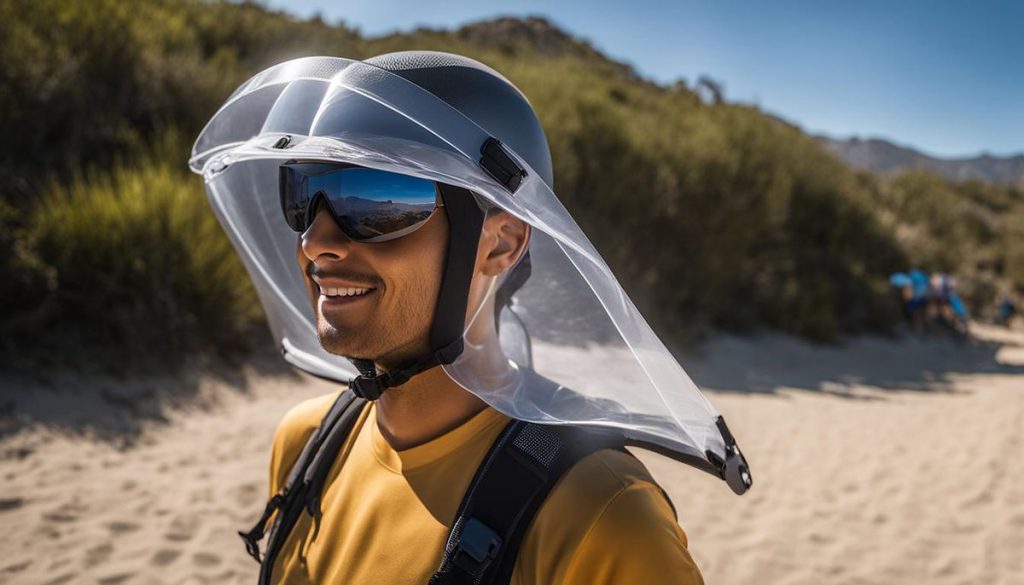Effective Skin Care Tips For Lupus: Safeguarding Your Skin
 November 16, 2023 | Lupus
November 16, 2023 | Lupus
If you have lupus, taking care of your skin is essential to manage lupus skin issues and protect it from damage. People with lupus, especially those with photosensitivity, need to be extra cautious in order to avoid flare-ups and safeguard their skin from harmful UV rays.
Managing lupus skin symptoms can be challenging, but with the right skin care routine and precautions, you can minimize the impact of lupus on your skin. Understanding the effects of UV light, adopting sun protection measures, and making necessary lifestyle modifications can make a significant difference in maintaining healthier skin.
In this article, we will discuss the importance of protecting your skin with lupus and provide you with effective skin care tips to manage lupus skin issues. By following these recommendations, you can enhance your skin’s health and overall well-being.

Key Takeaways:
- People with lupus, especially those with photosensitivity, need to take extra care of their skin to avoid flare-ups and protect it from harmful UV rays.
- UV light can worsen lupus symptoms and trigger flare-ups, causing fatigue, joint pain, and skin rashes.
- Understanding the damaging effects of UV light is crucial for protecting lupus skin.
- Effective sun protection measures include using broad-spectrum sunscreen, wearing protective clothing, and covering light sources.
- Medications can increase sun sensitivity, and discussing them with your healthcare provider is important for managing lupus skin care.
Understanding Lupus and Photosensitivity
Living with lupus can be challenging, especially when it comes to managing photosensitivity.
Photosensitivity refers to the heightened sensitivity to ultraviolet (UV) light that many people with lupus experience. In fact, it is estimated that 40% to 70% of lupus patients are sensitive to UV rays. This sensitivity can lead to flare-ups and worsen symptoms such as fatigue, joint pain, and skin rashes.
It is important to understand the triggers of photosensitivity in lupus. UV light, whether from natural sunlight or artificial sources like fluorescent bulbs, can cause damage to cellular DNA. In individuals with lupus, their cells are more sensitive to this damage, triggering an immune system response. The immune system may produce antibodies that target healthy cells, resulting in inflammation and the symptoms characteristic of lupus flare-ups.
Protecting Yourself from Photosensitivity
- Limit your exposure to sunlight, especially during peak hours when the sun’s rays are the strongest.
- Wear protective clothing, such as tightly woven long-sleeved shirts, pants, and wide-brimmed hats, to shield your skin from UV rays.
- Opt for sunglasses that provide UV protection to shield your eyes from harmful rays.
- Cover fluorescent and halogen bulbs with UV-blocking shields to reduce exposure to artificial UV light sources.
It’s crucial for individuals with lupus to understand the impact of photosensitivity on their skin and take necessary precautions to protect themselves from UV light. By adopting sun protection measures, such as wearing sunscreen and protective clothing, and making lifestyle modifications to minimize UV exposure, you can reduce the risk of flare-ups and promote healthier skin.
By taking these steps, you can help manage photosensitivity in lupus and safeguard your skin from the damaging effects of UV light. Remember, protecting your skin is essential for maintaining overall well-being and managing the symptoms of lupus.
The Damaging Effects of UV Light on Lupus Skin
Lupus skin is particularly vulnerable to the damaging effects of UV light. When exposed to UV radiation from natural sunlight or artificial sources, such as tanning beds, the cells in the skin can experience cellular DNA damage. While everyone’s cells are susceptible to this damage, individuals with lupus have cells that are even more sensitive.
This cellular DNA damage triggers an immune system response in people with lupus. The immune system produces antibodies that target the damaged cells, leading to inflammation and the onset of lupus symptoms. This immune response can worsen existing skin issues and potentially trigger lupus flare-ups.
Understanding the damaging effects of UV light on lupus skin is crucial for effectively managing the condition. By taking necessary precautions to protect your skin from UV radiation, you can minimize the risk of flare-ups and reduce further damage to your skin.
A lupus patient’s skin under UV light, showing redness, inflammation, and blistering. The skin looks fragile and thin, with visible veins. The background is dark to highlight the damaged skin.

The Importance of Sun Protection for Lupus Skin
Sun protection plays a vital role in safeguarding lupus-sensitive skin from the harmful effects of UV light. By adopting sun protection measures, you can create a barrier between your skin and the damaging rays of the sun.
- Apply a broad-spectrum sunscreen with a minimum SPF of 30 or higher before heading outside.
- Wear tightly woven clothing that covers your arms, legs, and other exposed areas.
- Opt for a wide-brimmed hat to protect your face, neck, and ears.
- Don’t forget to protect your eyes with sunglasses that offer UV protection.
Additionally, it’s important to take extra precautions indoors. Consider covering fluorescent and halogen bulbs with UV-blocking shields and tinting car windows to reduce exposure to UV radiation.
Sun Protection Measures for Lupus Skin Care
To protect your skin from the damaging effects of UV light and minimize the risk of flare-ups, it is important to adopt effective sun protection measures for lupus skin care. Here are some strategies to help you safeguard your skin:
1. Apply a broad-spectrum sunscreen:
Choose a sunscreen with a Sun Protection Factor (SPF) of 30 or higher that offers broad-spectrum protection against both UVA and UVB rays. Apply it generously to all exposed areas of your skin, including your face, neck, and hands. Reapply every two hours or more frequently if you are sweating or swimming.
2. Wear protective clothing:
Opt for tightly woven clothing that covers your arms and legs, as well as a wide-brimmed hat that shades your face, neck, and ears. This will provide an additional layer of protection against harmful UV rays.
3. Don’t forget your sunglasses:
Choose sunglasses that offer 100% UV protection to shield your eyes from the sun’s harmful rays. This will help protect your eyes from UV-related damage and reduce the risk of eye irritation or sensitivity caused by lupus.
4. Cover light sources and tint windows:
If you spend a significant amount of time indoors, consider covering fluorescent and halogen light sources with UV-blocking shields or filters. Additionally, tinting your car windows can help reduce the amount of UV radiation that enters your vehicle.
By incorporating these sun protection measures into your daily routine, you can help minimize the impact of UV light on your lupus-sensitive skin and reduce the risk of flare-ups. Remember, protecting your skin is essential for managing lupus and promoting overall well-being.
Choosing the Right Sunscreen for Lupus Skin
When it comes to protecting your skin from harmful UV rays, choosing the right sunscreen is essential. For individuals with lupus, finding a sunscreen that provides adequate protection while being gentle on sensitive skin is paramount. Here are some key factors to consider when selecting a sunscreen for lupus skin care:
- Physical vs. Chemical Sunscreen: There are two main types of sunscreens – physical and chemical. Physical sunscreens containing titanium dioxide or zinc oxide create a barrier on the skin’s surface, reflecting UV rays away. They provide better protection against both UVA and UVB rays and are less likely to cause irritation. On the other hand, chemical sunscreens absorb UV rays and convert them into heat. While they can be effective, some individuals with lupus may be more prone to skin reactions with chemical sunscreens.
- Broad-Spectrum Sunscreen: Look for a sunscreen that offers broad-spectrum protection, meaning it protects against both UVA and UVB rays. This ensures comprehensive coverage against damaging radiation.
- High SPF Sunscreen: Sun Protection Factor (SPF) measures a sunscreen’s ability to protect against UVB rays. For individuals with lupus, it is recommended to choose a sunscreen with a higher SPF, ideally SPF 30 or higher, to provide enhanced protection.
- Sunblock for Lupus Skin: In addition to sunscreen, consider using sunblocks that provide physical protection and form a physical barrier on the skin. These may include tinted physical sunscreens, which not only provide sun protection but also help even out skin tone and minimize the appearance of redness.
Expert Tip:
“When selecting a sunscreen for lupus skin care, look for physical sunscreens with broad-spectrum protection and a higher SPF. Consider trying tinted physical sunscreens to avoid leaving a white residue on the skin.”
Remember, protecting your skin from UV radiation is crucial for managing lupus and maintaining healthier skin. By choosing the right sunscreen that suits your needs, you can minimize the risk of flare-ups and enjoy the outdoors with confidence.
Additional Sun Protection Measures for Lupus Skin
When it comes to protecting your lupus-sensitive skin from harmful UV rays, sunscreen is not the only solution. Consider implementing these additional sun protection measures to safeguard your skin and minimize the risk of flare-ups:
- Use UV-blocking shields: Cover fluorescent and halogen bulbs with UV-blocking shields to reduce exposure to UV radiation indoors.
- Tint your car windows: Install tinted windows in your car to block a significant amount of UV rays, providing added protection while you’re on the go.
- Opt for sunglasses with UV protection: Choose sunglasses that offer adequate UV protection to shield your eyes and the delicate skin around them from harmful rays.
These extra precautions can go a long way in ensuring your lupus skin stays healthy and protected from the damaging effects of UV radiation. By minimizing your exposure to UV rays both indoors and outdoors, you can reduce the risk of triggering lupus flare-ups and further damage to your skin.
“UV-blocking shields, tinted car windows, and sunglasses with UV protection are valuable additions to your sun protection arsenal. They provide an extra layer of defense against UV radiation, helping to keep your lupus-sensitive skin safe and reducing the likelihood of flare-ups.”
Remember, while these additional measures offer added protection, they should be used in conjunction with broad-spectrum sunscreen, protective clothing, and other sun protection practices. By implementing a comprehensive sun protection routine, you can take control of your lupus skin care and minimize the impact of UV radiation on your skin.

Lifestyle Modifications to Minimize UV Exposure
When you have lupus and photosensitivity, making certain lifestyle modifications can help minimize your exposure to harmful UV rays and protect your skin both indoors and outdoors. Here are some practical tips to modify your environment and reduce the risk of flare-ups:
- Adjust lighting conditions: Use dimmer switches or choose softer lighting to reduce UV exposure indoors. Avoid fluorescent and halogen bulbs that emit UV radiation.
- Wear protective clothing: Opt for tightly woven clothing made from sun-protective fabrics. Long sleeves, pants, and wide-brimmed hats offer additional coverage to shield your skin from the sun’s rays.
- Avoid peak sun hours: Stay indoors or seek shade between 10 am and 4 pm when the sun’s rays are the strongest. If you need to be outside, try to schedule activities earlier in the morning or later in the afternoon.
- Use UV-blocking shields: Install UV-blocking shields on windows to minimize UV exposure at home or in the office. These shields can help filter out harmful rays without compromising natural light.
- Wear sunglasses with UV protection: Choose sunglasses that provide 100% UV protection to shield your eyes and the delicate skin around them from sun damage.
By implementing these lifestyle modifications, you can create a safer environment for your skin and reduce the impact of UV radiation on your lupus symptoms. Remember, protecting your skin from the sun is an essential part of managing lupus and maintaining your overall well-being.
Quote:
“Making simple changes to your daily routine can have a significant impact on protecting your skin from the sun. By adjusting lighting conditions, wearing protective clothing, and avoiding peak sun hours, you can minimize your UV exposure and reduce the risk of lupus flare-ups.” Dr. Sarah Johnson, Dermatologist
Medications and Sun Sensitivity
Certain medications can increase photosensitivity in individuals with lupus, making their skin more prone to sunburn and flare-ups. It is important to be aware of these medications and take necessary precautions to protect your skin from the harmful effects of the sun. Here are some key points to consider:
- Discuss with your healthcare provider: If you have lupus and are taking medications, it is crucial to discuss their potential effects on sun sensitivity with your healthcare provider. They can provide valuable insight and guidance on managing these effects and adjusting your treatment plan if needed.
- Be cautious with common medications: Some commonly used medications, such as certain antibiotics, anti-inflammatory drugs, and blood pressure medications, can increase your sensitivity to the sun. It is important to be aware of these potential side effects and take appropriate measures to protect your skin.
- Protective measures: When taking photosensitivity-inducing medications, it is essential to be diligent in your sun protection routine. This includes wearing sunscreen with a high SPF, seeking shade, wearing protective clothing, and using accessories like sunglasses and hats to shield your skin from UV rays.
- Consider alternative options: In some cases, if a medication is causing significant sun sensitivity, your healthcare provider may explore alternative treatment options that are less likely to have this side effect. It is important to discuss these possibilities with your healthcare provider to find the best solution for your individual needs.
By being informed and proactive, you can effectively manage the potential sun sensitivity caused by certain medications and minimize the risk of skin damage and flare-ups. Always consult with your healthcare provider for personalized advice and guidance regarding your medication regimen and sun protection measures.
Conclusion
Taking care of your skin is crucial when managing lupus. By following effective skin care tips, protecting your skin from harmful UV radiation, and making necessary lifestyle modifications, you can minimize flare-ups and maintain healthier skin.
In addition to these measures, considering natural remedies can further support your lupus skin care routine. Including ingredients like aloe vera, chamomile, and coconut oil in your skincare can provide soothing and moisturizing benefits for lupus-sensitive skin.
Remember, it’s important to discuss any changes to your skincare routine, as well as sun sensitivity-inducing medications, with your healthcare provider. They can provide personalized advice and ensure your overall treatment plan is optimized for managing your lupus symptoms.
By prioritizing your skin care and adopting a lupus-friendly skincare routine, you can promote overall well-being and maintain healthier skin throughout your journey with lupus.
Frequently Asked Questions
Can lupus cause sensitivity to UV light?
Yes, people with lupus, especially those with photosensitivity, can experience sensitivity to UV rays.
How does exposure to UV light affect lupus symptoms?
Exposure to UV light can worsen lupus symptoms and trigger flare-ups, leading to fatigue, joint pain, and skin rashes.
Why is it important to protect lupus-sensitive skin from UV light?
UV radiation can cause cellular DNA damage and trigger inflammation in people with lupus, leading to further symptoms and skin issues.
What are some effective sun protection measures for lupus skin?
Applying a broad-spectrum sunscreen, wearing protective clothing, a wide-brimmed hat, and sunglasses are key sun protection measures for lupus skin.
What type of sunscreen is best for lupus skin?
Physical sunscreens containing titanium dioxide or zinc oxide provide better protection against UVA and UVB rays. Look for broad-spectrum sunscreens with a higher SPF (at least 45) for maximum sun protection.
Are there any additional sun protection measures for lupus skin?
Yes, using UV-blocking shields for light sources, tinting car windows, and wearing sunglasses with UV protection can provide extra defense against UV radiation.
What lifestyle modifications can help minimize UV exposure for people with lupus?
Adjusting lighting conditions at home and work, wearing protective clothing and accessories, and avoiding peak sun hours can help minimize UV exposure for people with lupus.
Can medications affect sun sensitivity in people with lupus?
Yes, certain medications, such as antibiotics, anti-inflammatory drugs, and blood pressure medications, can make individuals more photosensitive. It is important to discuss your medication regimen with your healthcare provider.
How can I take care of my skin when managing lupus?
By following effective skin care tips, protecting your skin from UV radiation, making necessary lifestyle modifications, and discussing medication effects with your doctor, you can minimize flare-ups and maintain healthier skin.
Source Links
- https://www.lupus.org/resources/uv-exposure-what-you-need-to-know
- https://www.webmd.com/lupus/features/lupus-sun-protection
- https://www.brighamandwomens.org/medicine/rheumatology-inflammation-immunity/lupus-center/fact-sheets/lupus-and-the-skin
ABOUT

Hey there! I'm Angela,
I am a survivor of cancer, lupus, fibromyalgia, and a teenage daughter. Join me as I document my experiences and educate the world on my chronic illness journey.


